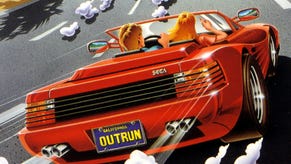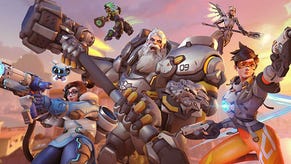Retrospective: Mass Effect
Lovin' an elevator.
But BioWare was right to go shooter, even if it fell a tiny bit short, because it also serves an important narrative function. In a vast, ponderous galaxy where the smallest units of time and distance are years or tens of thousands of kilometres, the immediacy of gun combat reinforces that scale: engagements are over in a matter of seconds, even if you insist on the optional granularity of constant micromanagement; mere specks of space and time in a universe with bigger problems. As Douglas Adams pointed out, space is big. Mass Effect respects that.
Besides, you don't have to go shooting all the time. There are six character classes, allowing for varying play styles, and even within the shooter-heavy Soldier class there's scope for specialisation thanks to team orders, and separate experience paths for different core weapons. Each of the other classes involves a bit of shooting, but with two crewmembers at your side on any given mission you can pick a style that you like - using an Adept to levitate enemies for Soldiers, or an Engineer to debuff enemies, or any of lots of other possibilities.
Plus, your aiming, scope stability and other combat abilities are also bound tightly to your equipment selection and choices on the level-up screen. Inventory and ability management is confusing to begin with (which is a shame given how much time you spend doing it), but along with exploring and arguing, and running and gunning, alphabetising your rifles and making sure your colleagues' grenade modifiers are appropriate to the local fauna is a silent third pillar of fun. And just as the line between the conversation system and "aggressive negotiations" is nonexistent, so is that between your toolbox and the rest.
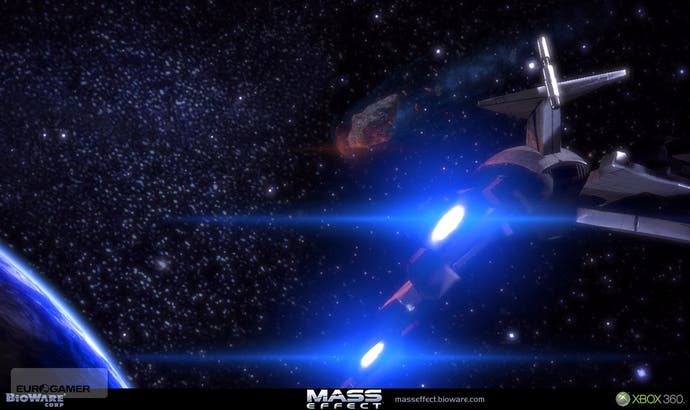
Then there's Mass Effect 2. While it's not out until the end of January, and I've not played it yet, I can already tell you how it began, because Mass Effect told me - and you, assuming you ever bothered going to Edolus. Like a lot of the side-quest planets, Edolus begins innocuously enough - just you and the Mako Mountain Climbing Team out for a drive, homing in on a distress signal. You come out onto a plain and spot the husk of a tatty old Alliance vehicle surrounded by scattered bodies. There's a beacon. It's so blatantly a trap.
It's a trap. A Thresher Maw bursts out of the throbbing ground, mouth parting like a children's handheld windmill of doom, and spits green death in your direction. This is going to be a tough one - you may need to drive backwards and forwards holding the "shoot" button for several minutes.
Maw down, you investigate, and realise these men are the ones Admiral Kahoku was telling you about last time you visited the Citadel. When you report back to him later he promises to investigate, and it puts him on the trail of Cerberus, a human supremacist organisation. The Nick Griffins of space, they give humanity a bad name (other than "Cerberus", which is kind of cool), and yet it's them to whom you'll be going in Mass Effect 2 as you try to work out why human colonies are disappearing.
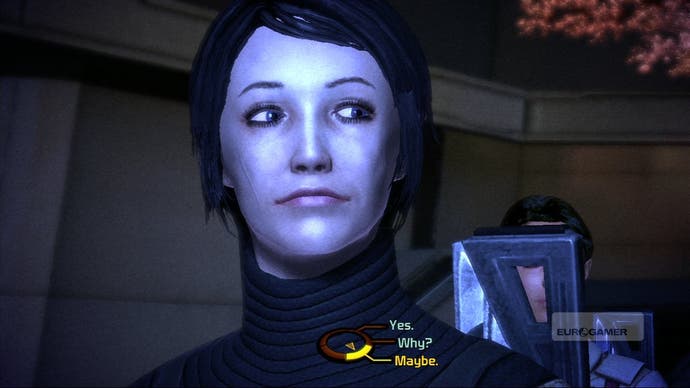
The Cerberus assignment doesn't just seed the organisation though - it implies that BioWare's promising claims about the trilogy's underlying knitting may be more 'operatic tapestry' than 'Christmas sweater'. Because you don't just hear about the Cerberus organisation in the first game - you can also go looking for them.
Mass Effect is appealing enough in the short term, but this sort of thing may well end up being the key to its long-term success as a series, if not its greatest triumph. Games in the same series have spoken to one another for ages, but generally it's just been basic stuff - a few bonus experience points if you happen to buy the latest Tiger Woods and it finds a previous save-file on your hard disk, for example. Nothing to drive over a neighbour's fire hydrant about. But an RPG where individual instalments change dramatically based on your decisions in previous ones would be something else: the theory goes that a grumpy man-soldier who shoots through the first game asking questions later and adhering to the "Renegade" path might struggle to recognise the game that a sensible, thorough, "Paragon" Adept woman is playing by the end of the third instalment.
That's why people might end up thinking the series is amazing though. For now it's just an attractive theoretical quality of the first game. Which still leaves us with the question of why people like the first game. And if you play to the end of the Cerberus missions, and write down everything that happens, for all the things I love about the game you might still be left at a loss.
Events take you to Binthu, where you discover three research facilities marked on the map. Missions in Mass Effect typically involve driving the Mako around a bit before you go indoors and do some talking and shooting, although in this case the emphasis is on violence: rocking up to the first facility, you find it's guarded by a pair of heavy guns. The Mako can handle this sort of thing, as we saw with the Thresher Maw, but what I may have glossed over somewhat is that combat in the Mako is a bit like trying to do the washing up with your feet.

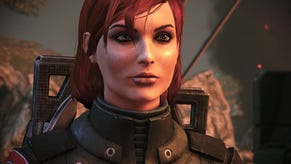

_bv0fQvp.jpg?width=291&height=164&fit=crop&quality=80&format=jpg&auto=webp)

